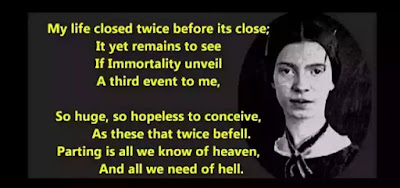Also Read
My Life Closed Twice Before Its Close
My life closed twice before its close
It yet remains to see
If immortality unveil
A third event to me.
So huge, so hopeless to conceive
As these that twice befall,
Parting is all we know of heaven,
And all we need of hell.
Summary
My life closed twice before its close-It remains to seeIf Immortality unveilA third event to me.
The poetess visualizes her own death before its actual arrival. She has witnessed this unusual experience twice in her life. The previous two experiences were no less tragic than the final termination of her life. Each past experience reminded her of her approaching hour of death. This means that the speaker was always haunted by the fear of death in her life. The sub-conscious fear of death never lifted from her sensitive mind. She still hopes if immortality can offer her the third experience of death.
So huge, so hopeless to conceiveAs these that twice befell.Parting is all we know of heaven,And all we know of hell.
The speaker has always been afraid of death throughout her life. She has even twice anticipated death her prior to its actual arrival. Each experience of death shattered the very life of the speaker. The pangs of death were almost identical after her every confrontation with death.
The speaker is stunned by the sense of desolation produced by the two unbearable losses. The two losses were so huge that is difficult to compromise with them in anyway. The word 'parting' is linked not only with heaven but also with hell. Farting leads to heaven and ensures the future happiness of the departed souls. Similarly, the experience of hell can be felt in anguish of parting.
Critical Analysis
'My life closed before its close' is a very witty poem. The poem exists only in transcript, so we have no idea when it was written. Although heaven and hell ara mentioned, and although some critics see the parting as deaths, the parting is probably not the result of death. Probably the subject is the departure of dear friends who are expected to be long lost or forever absent.
The speaker seemed to have twice the experience of death before the final ending of her life. The previous two experiences were no less tragic than the final collapse of her life. Each past experience reminded her of the approaching hour of death. This shows that the poetess was always haunted by the fear of death which pervaded throughout her life. She still hopes if immortality can offer her the third experience of death.
Second II stanza captures the all-powerful sense of. Desolation produced by the two unbearable losses. The two losses are so huge that it is futile to imagine them satisfactorily. The word 'parting' is linked not only with heaven but also with hell. Parting leads to heaven and ensures future happiness of the souls. Similarly, the experience of hell can be felt in the anguish of parting.
Ambiguity:
It is a very witty poem. The world 'parting' is very ambiguous because of its double meaning. The parting may be due to death or the parting of dear friends who are either lost or forever absent from the main stream of life. The description of parting as being both 'heaven' and 'hell' is brilliantly witty. Finally, the experience of hell is implied in the unbearable pains of separation.
Annotations:
'My' - stands for the speaker or the poetess. 'Closed' - ended or terminated. 'Immortality' - deathlessness. 'unveil' - reveals. 'Event' - experience of death. 'Huge - mighty. 'Conceive' - visualise. 'Befell' - taken place. 'Parting' - separating.
